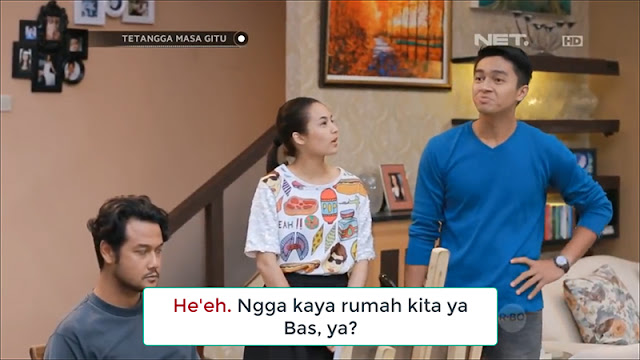- Get link
- X
- Other Apps
Posted by
Iman Prabawa
on
- Get link
- X
- Other Apps
Halo semuanya, ketemu lagi dengan saya, Iman Prabawa. In this article, I want to talk about the meaning of the word [he'eh] in Indonesian. As always, we are going to be watching examples from movies and whatnot, where the word is spoken by Indonesians.
If you have any questions regarding the Indonesian language, you can ask me directly. You can see how to do that on my About Me page.
If you are a beginner in the Indonesian language, you can learn step by step with My Lesson Here.
So, let's get started.
Next, let's watch examples where Indonesians use the word [he'eh].
Below is the transcription from the conversation in that scene with English translation.
You will hear "he'eh" a lot in daily conversation in Indonesia. Now, let's watch the second scene, still from the same movie.
And below is the transcription from the conversation in that scene with English translation.
And the last one, let's watch the third scene, still from the same movie. So, from the same movie, you heard so many "he'eh" in this short movie. This movie is only about 9 minutes long, and you just heard 4 "he'eh" in it.
You will hear a lot of "he'eh" if you're in Indonesia because it's just the way Indonesian people say yes in the informal version.
And below is the transcription from the conversation in that scene with English translation.
Second example.
Third example.
I think that's all for the meaning of "he'eh" in Bahasa Indonesia. I hope you get the idea and understand what I just explained to you.
If you are still confused and want to ask me something, just make a comment in the comment section below. Thank you very much.
He'eh In Bahasa Indonesia
He'eh is informal for yes or okay. When we agree with what someone is saying, then usually we say "he'eh". You will hear this a lot in conversation in Indonesian.How to Pronounce He'eh
Here is how you pronounce [he'eh] in bahasa Indonesia.Next, let's watch examples where Indonesians use the word [he'eh].
Examples of He'eh In Use
Let's watch our first scene from a movie titled Tetangga Masa Gitu, where the woman in that scene agreed with what her husband was saying.Below is the transcription from the conversation in that scene with English translation.
Husband: Wah, asyik nih rumahnya. Kelihatan penuh gitu ya sayang ya? (This house is so cool, isn’t it? Isn’t it looks so packed, honey?)
Wife: He'eh. Ngga kaya rumah kita ya Bas, ya? Masih berasa kosong. (Yeah, you’re right. Not like our house. Still feels so empty.)
Husband: Iya, namanya juga rumah baru. (Yeah, because our house is still new.)So when you agree with what someone is saying, then you can say "iya" for the formal version or you can say "he'eh" for the informal version.
You will hear "he'eh" a lot in daily conversation in Indonesia. Now, let's watch the second scene, still from the same movie.
And below is the transcription from the conversation in that scene with English translation.
A: Kamu kepengen punya meja pingpong di ruang tamu kamu, kan? (You want to have a ping pong table in your living room, right?)
B: He'eh. (That's right.)
A: Kamu ngga bakal dapet. (You won't get any.)As you can see, there is the word "dapet". It's the same meaning as "dapat". In an informal situation, sometimes people write it like that, so don't be confused with the words "dapat" and "dapet". It's the same word. "Dapat" is more formal, and "dapet" is informal, and you'll see it in conversational Bahasa Indonesia.
And the last one, let's watch the third scene, still from the same movie. So, from the same movie, you heard so many "he'eh" in this short movie. This movie is only about 9 minutes long, and you just heard 4 "he'eh" in it.
You will hear a lot of "he'eh" if you're in Indonesia because it's just the way Indonesian people say yes in the informal version.
And below is the transcription from the conversation in that scene with English translation.
A: Tadi istri kamu bilang, "Ide brilian tuh, Bas!" (Your wife said to you just now, “It’s a brilliant idea, Bas!”)
B: He'eh. (Yeah.)
A: Karena sebelumnya kamu nanya ke dia, "Ide brilian ngga tuh, Bi?" (Because you asked her before, “Isn’t it a brilliant idea, Bi?”)
B: He'eh. (Yeah.)
Example Sentences
I'm gonna give you 3 example sentences using [he'eh]. First example.A: Eh, loe jadi pergi kan? (You are going, aren’t you?)
B: He’eh. (Yes.)
Second example.
A: Enak kan? (It’s delicious, right?)
B: He’eh. Enak lho. (Yes, this is delicious.)
Third example.
A: Buku ini punya loe ya? (Is this book yours?)
B: He’eh, itu punya gue. (Yes, that’s mine.)
I think that's all for the meaning of "he'eh" in Bahasa Indonesia. I hope you get the idea and understand what I just explained to you.
If you are still confused and want to ask me something, just make a comment in the comment section below. Thank you very much.
Location:
Jakarta, Indonesia
- Get link
- X
- Other Apps
Hello, I'm Iman Prabawa a.k.a Pak Guru Iman. I love to share about languages. My Instagram, @iman_prabawa

Comments
Post a Comment